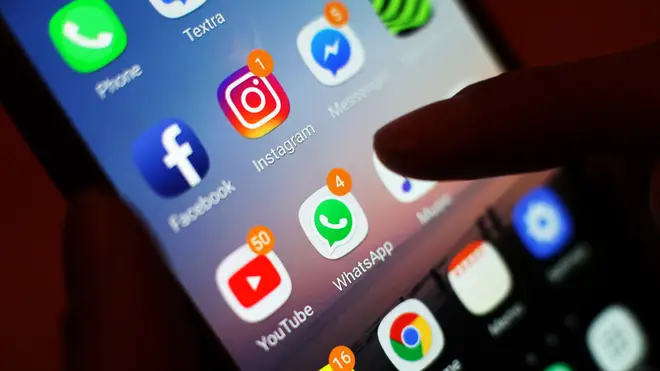
Tom Swarbrick 4pm - 6pm
18 December 2018, 12:45 | Updated: 18 December 2018, 21:23

Before I start this article, I wish to make clear that the person who it's about has encouraged me to write it.
On Friday's 'Politics Live' I took part in a very constructive debate on mental health with Tom Kibasi, Faiza Shaheen and Isabel Hardman, who has talked openly about her issues with depression.
Personally, I have never suffered from depression, but I know many people who do.
It's a subject which I talk about regularly on my LBC show. At university I was a counsellor on the UEA Nightline service.
Little did I know what that debate on 'Politics Live' was to lead to on Saturday night.
At around a quarter to midnight my phone rang.

It was someone who I knew from the world of politics, but not well.
We had texted a few times, but met only once.
Initially I assumed it was a pocket call but I knew from Twitter that this person had had a few personal problems of late, so I interrupted Episode Two of 'Mrs Wilson' and took the call.
As soon as I answered the call I knew something was very wrong.
Michael is not his name, but for the purposes of what I am about to tell you, that's what I am going to call him.
Those were his opening words, so far as I recall.
He explained that he was often having suicidal thoughts following a traumatic personal experience a few months ago.
He had tried to get treatment on the NHS but was told there was a lengthy waiting list.
He had been to see an NHS Crisis team and told them of his state of mind.
Their advice was to compile a list of 10 people he could call if he ever felt suicidal again.
The second thing he said to me was that I was number 10 on his list and he kept apologising for the fact.
Eventually it transpired that the other nine people hadn't picked up.
I left my partner and our friend and walked out to the kitchen, where I proceeded to talk to him for around 45 minutes with the rather obvious aim of talking him down from what he was intending to do.
Having very little experience of this I knew that one wrong word could have some very tragic consequences.
I won't go into all the details of the conversation but during it Michael told me that when he was referred to NHS mental health services he was told there would be a two year wait for treatment.
Even when he phoned the Samaritans he was told there would be a 30-minute wait to talk to anyone.
The last time I had a similar experience to this was when I talked to Bill on the M25 on my radio show.
He told me he intended to take his own life later that evening because he didn't feel he had anything to live for.
I was a relatively newcomer to LBC at the time and hadn't ever contemplated having to have this kind of discussion live on air.
I think the most important thing you can do is listen, and that's what I did with both Bill and Michael.
The fact that they had phoned demonstrated that while they were certainly thinking of doing it, they didn't really want to.
They wanted to be told there was something to live for.
They didn't want to hear a series of trite cliches, but as well as listening it was important for them to understand that they only was is up.
That there could be light at the end of the seemingly very dark tunnel they were travelling through.
In all honesty I can't remember all that I said.
I do remember asking him to think about the effect on his friends and family if he did go through with it, and how upset they would be.
Was that the right thing to do ? No idea.
What I do know is that I felt the most important thing to try to persuade him of was that there was something to live for.
That he meant something to a lot of people.
That it wouldn't always be like this. But, as I said, listening to him explain why he felt the way he did was probably more important.
Last Thursday we did an hour's phone-in on Drink Driving.
I took a call from a lady called Carol who told me how in 1992 her son was killed by a drunk driver and about the devastating effect it had on her life.
Even more than a quarter of a century later, she says she still thinks of him as she wakes up every morning, and he's the last person she thinks of when she goes to sleep.
Anyone who heard her call will know how powerful it was.
My next caller was someone who described himself as a "habitual drink driver". He does it three times a week, but says he wants to stop.
I told him the best way to achieve this was to write the word "CAROL" on a piece of paper and stick it to his steering wheel, because every time he got in his car drunk and saw that word, Carol's words would register in his mind.

I relate this story because I needed to convince Michael of the consequences of his intended action. I think it registered.
By the end of the conversation it had become more normal and I was relieved when I heard Michael laugh.
Before we finished talking I asked him to text me the following morning to tell me he was OK.
We had a couple of text exchanges on Sunday.
It is quite clear that Michael and many others like him are being let down by the NHS.
It is simply not acceptable for someone who has suicidal tendencies to be told that they will have to wait months, or even years for proper treatment.
Isabel Hardman explained how she had a similar experience and had to spend her life savings going private.
But what about those who don't have any savings to fund such treatments?
I often argue that the NHS fails some patients because of structures, rather than a lack of funding.
But it is clear that in the field of mental health, funding is indeed the main issue.
And it is one which must now be addressed.
I am not expert enough to say what is needed or what needs to be changed but it's something I hope the new Health Secretary addresses very quickly.
I'm going to make sure he reads this article. Michael has read this article before I posted it and sent this quote for me to use...
I know you'll all want to wish him well and encourage him on his road back to full health.
Meanwhile, if he ever needs to talk again - and I hope he won't (but you know what I mean!) - he is welcome to call me any time.
Day or night.